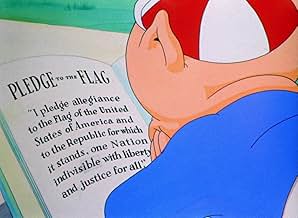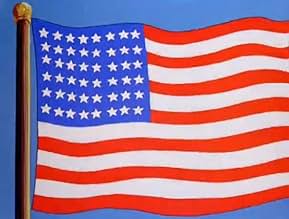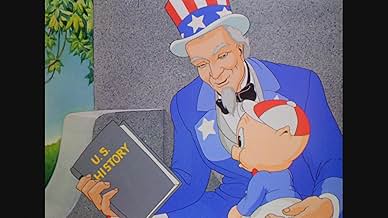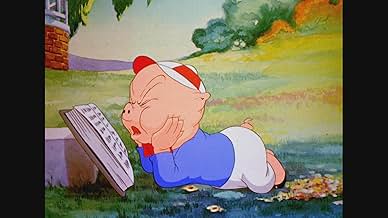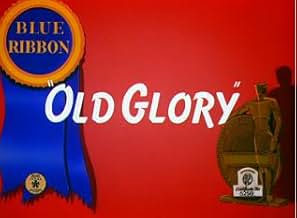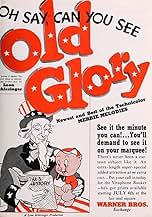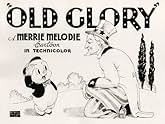Porky suddenly refuses at learning the Pledge of Allegiance until Uncle Sam appears to him in his dreams and gives him a lesson in American history.Porky suddenly refuses at learning the Pledge of Allegiance until Uncle Sam appears to him in his dreams and gives him a lesson in American history.Porky suddenly refuses at learning the Pledge of Allegiance until Uncle Sam appears to him in his dreams and gives him a lesson in American history.
John Deering
- Uncle Sam
- (voice)
- (uncredited)
John Litel
- Patrick Henry
- (archive sound)
- (uncredited)
Shepperd Strudwick
- Paul Revere
- (voice)
- (uncredited)
- Director
- Writers
- All cast & crew
- Production, box office & more at IMDbPro
Featured reviews
This is one of those Looney Tunes cartoons used by Warner Brothers not mainly to entertain kids, but to educate them about the USA. In other words: Tell the children how good and brilliant and important the USA is and how many good and brave people died for 'this great country'. This is why Uncle Sam tells a dreaming Porky Pig to learn his Pledge of Allegiance. That's obviously the educational part of this 9-minutes long film, logically would be to start with the entertaining/funny things now, but in 'Old Glory' there is no fun. There isn't even an attempt made to be funny! As if the creators forgot that Looney Tunes cartoons are supposed to be witty or spoofing or something, but this particular one is tasteless in it's lack of entertainment what so ever!
In the era this little film was made, it wasn't unusual to promote the greatness and beauty of the USA or to make the USA-enemies look dumb/stupid. For instance in 'Bugs Bunny Nips the Nips' (1944) Bugs blows up several Japanese with exploding ice-cream! This all happened during the Second World War and although it's immoral to influence children the way it's done in this cartoons (and other Looney Tuners), you have to admit it's smart to use the Looney Tunes for this purpose. The cartoons are funny ('Old Glory' being the exception to this rule) and kids (and adults as well) adore Bugs, Daffy, Porky and all the others.
And that is why we see Porky Pig in 'Old Glory' studying and dreaming of the greatness of his country. With Uncle Sam explaining him (and the unknowing little viewers) all about how important loving the USA is. In an immoral, joke-less, spoof-less, un-witty cartoon.
In the era this little film was made, it wasn't unusual to promote the greatness and beauty of the USA or to make the USA-enemies look dumb/stupid. For instance in 'Bugs Bunny Nips the Nips' (1944) Bugs blows up several Japanese with exploding ice-cream! This all happened during the Second World War and although it's immoral to influence children the way it's done in this cartoons (and other Looney Tuners), you have to admit it's smart to use the Looney Tunes for this purpose. The cartoons are funny ('Old Glory' being the exception to this rule) and kids (and adults as well) adore Bugs, Daffy, Porky and all the others.
And that is why we see Porky Pig in 'Old Glory' studying and dreaming of the greatness of his country. With Uncle Sam explaining him (and the unknowing little viewers) all about how important loving the USA is. In an immoral, joke-less, spoof-less, un-witty cartoon.
10Vimacone
With the rise of facism in Europe and war right around the corner, there was a concern in America about the future of Democracy. Hollywood produced a number of films illustrating American History and the importance of democracy.
Chuck Jones had fairly recently become a director and was trying to emulate Disney by using extensive realism in his shorts. An approach that was very contrary to his colleagues. However, that is probably what led him to producing a contribution to the patriotic films that were being produced in 1939. It's been noted as one of the few WB cartoons that was devoid of any gags or humor. Yet, it is one of the greatest that the studio ever produced.
It's a concise overview of American history with an emphasis on the struggles for liberty and freedom; the theme being the importance of reciting The Pledge Of Allegiance as told by Uncle Sam to Porky Pig.
It's a very stirring and patriotic film. The lush visuals and strong orchestra make this a timeless American classic.
Chuck Jones had fairly recently become a director and was trying to emulate Disney by using extensive realism in his shorts. An approach that was very contrary to his colleagues. However, that is probably what led him to producing a contribution to the patriotic films that were being produced in 1939. It's been noted as one of the few WB cartoons that was devoid of any gags or humor. Yet, it is one of the greatest that the studio ever produced.
It's a concise overview of American history with an emphasis on the struggles for liberty and freedom; the theme being the importance of reciting The Pledge Of Allegiance as told by Uncle Sam to Porky Pig.
It's a very stirring and patriotic film. The lush visuals and strong orchestra make this a timeless American classic.
10tavm
I first saw this Porky Pig educational cartoon short on Buskin Bill's Storyland in the Bicentenial year of 1976. I later saw it after James Cagney's Yankee Doodle Dandy on a Saturday night on that same channel of WAFB-9, Baton Rouge, La. (possibly on the 4th of July). Having recently seen it on YouTube, I must marvel at how bright the colors are compared to the washed-out tones I remember from way back when. Great use of having Uncle Sam telling our stuttering hero about the American Revolution and subsequent events with wonderful realistic animation throughout to make their point. Highly recommended to any child who wonders why history is so important to learn.
Porky Pig learns why the Pledge of Alligence is important when he has a dream of Uncle Sam who tells him about the founding fathers in this educational short. You can practically hear the liberals of today groaning and bitching at the mere prospect of even thinking about watching this short, but it is very well put together and makes one proud to be an American so it accomplishes what it's intended porpoise was. Hell, I still think this short should be shown in classrooms, but that will in all likelihood never happen due to the loony Left 9th Circuit of Appeals in California, although Michael A. Newdow might be happy to get the pre-1954 version of the Pledge back (I strongly doubt that he'd stop at that though). This animated short can be seen on Disc 3 of the Looney Tunes Golden Collection Volume 2 and also features an optional commentary by Jerry Bech & Inker and Painter Martha Sigall
My Grade: A
My Grade: A
Love animation, it was a big part of my life as a child, particularly Disney, Looney Tunes and Tom and Jerry, and still love it whether it's film, television or cartoons.
Chuck Jones is one of the greatest geniuses in animation history, or at least to me and many others. 'Old Glory' is a different effort for him, being focused more on history and education rather than wit and humour (fans of the Jones and Looney Tunes that they're familiar with will be disappointed). It's a pretty decent one too and an interesting look at what he was capable of in his early days before he found his style. It is fair to say though that Jones did go on much better things when his cartoons became much funnier, wittier, more inventively animated and iconic characters introduced and made household names.
'Old Glory' does have segments that are agreed on the brief side and end rather abruptly.
Porky is likable enough but a bit bland (with all of the featured supporting historical characters and Uncle Sam making more of an impression), while the story tends to be episodic.
However, the animation is very good. It's beautifully drawn, very detailed and the colours are vibrant, complete with some great expressions for particularly the rabbit.
Carl Stalling's music score is typically lushly and cleverly orchestrated, with lively and energetic rhythms, it's also beautifully synchronised with the action and gestures/expressions and even enhances the impact. All of those things Stalling was an unparalleled master at in animation, or at least in my view.
Despite it lacking Jones' usual wit and humour, 'Old Glory' offers a very interesting glimpse at American history, doing it in a way that's educational and makes some good points without laying it on too thick. Any patriotism feels neither too preachy or tacky. The supporting characters are fun to spot and the voice acting is good.
Overall, not one to be seen for humour's sake but well-made and interesting. 7/10 Bethany Cox
Chuck Jones is one of the greatest geniuses in animation history, or at least to me and many others. 'Old Glory' is a different effort for him, being focused more on history and education rather than wit and humour (fans of the Jones and Looney Tunes that they're familiar with will be disappointed). It's a pretty decent one too and an interesting look at what he was capable of in his early days before he found his style. It is fair to say though that Jones did go on much better things when his cartoons became much funnier, wittier, more inventively animated and iconic characters introduced and made household names.
'Old Glory' does have segments that are agreed on the brief side and end rather abruptly.
Porky is likable enough but a bit bland (with all of the featured supporting historical characters and Uncle Sam making more of an impression), while the story tends to be episodic.
However, the animation is very good. It's beautifully drawn, very detailed and the colours are vibrant, complete with some great expressions for particularly the rabbit.
Carl Stalling's music score is typically lushly and cleverly orchestrated, with lively and energetic rhythms, it's also beautifully synchronised with the action and gestures/expressions and even enhances the impact. All of those things Stalling was an unparalleled master at in animation, or at least in my view.
Despite it lacking Jones' usual wit and humour, 'Old Glory' offers a very interesting glimpse at American history, doing it in a way that's educational and makes some good points without laying it on too thick. Any patriotism feels neither too preachy or tacky. The supporting characters are fun to spot and the voice acting is good.
Overall, not one to be seen for humour's sake but well-made and interesting. 7/10 Bethany Cox
Did you know
- TriviaThe Pledge of Allegiance in 1939, as shown in the film, is two words shorter than the modern version. The words "under God" were added to the text in 1954, after a bill was signed into law, by President Dwight D. Eisenhower on June 14, 1954.
- GoofsThe states shown during the "vast movement to the west" sequence omit Georgia as an original state/colony. It appears after the Midwest/Great Lakes region is filled in on the map.
- Quotes
Paul Revere: To arms! To arms! To arms!
- Alternate versionsIn the original release, the end titles were super-imposed over the closing shot of the American flag with the words "The End" instead of the standard "That's All Folks!" In the Blue Ribbon reissue, however, this was replaced with the standard "That's All Folks!" closing (with a fade-to-black on the closing shot of the flag), in addition to the replacement of the original opening titles. The original end title has been restored to the version on the Looney Tunes Golden Collection Volume Two DVD set.
- ConnectionsFeatured in Boyz n the Hood (1991)
- SoundtracksThe Battle Hymn of the Republic
(uncredited)
Music by William Steffe
Played when Abraham Lincoln is presented
Details
- Release date
- Country of origin
- Language
- Also known as
- Merrie Melodies: Old Glory
- Production company
- See more company credits at IMDbPro
- Runtime
- 9m
- Sound mix
- Aspect ratio
- 1.37 : 1
Contribute to this page
Suggest an edit or add missing content

